The continent of Africa is endowed with many tribes, providing the continent with an opportunity to thrive. Black people can leverage the African tribes to succeed by uniting in this diversity. Africa is the continent with the largest group of tribes.
The African continent comprises 54 countries, more than 1.4 billion people, and more than 3,000 tribes. The Merriam-Webster dictionary defines a tribe as a social group made up of many families, clans, or generations that share the same language, customs, and beliefs.
Become an insider. Subscribe to our newsletter for more top trending stories like this!
In this article, you will meet the most popular tribes in Africa, which include:
1. Hausa – Nigeria, Algeria, Niger, Benin, Ivory Coast, Sudan, Ghana, Chad, Togo, and Burkina Faso

There are a lot of tribes in Nigeria but Hausa is the most popular among them. With an estimated number of 74 million people, the Hausa are a sizable tribe and one the most popular African tribes.
Research shows that about 64 million of them reside in Nigeria. However, they can also be found in significant numbers in Algeria, Niger, Benin, Ivory Coast, Sudan, Ghana, Chad, Togo, and Burkina Faso.
They are a multiethnic group that speaks the Hausa language.
The Hausa Kingdoms and at least the 7th century are where the Hausa people first appeared. The Hausa people were split up into numerous kingdoms that were connected by a common progenitor, and each of these kingdoms developed into specialized trading hubs in Africa. Leather, gold, and clothing were their main exports.
The cloth-weaving skills of the Hausa are well known. Their cuisine is well-known throughout Africa, and their architecture is likewise exquisite and gorgeous.
Numerous Sokoto Sultans and contemporary Nigerian footballer Ahmed Musa are notable Hausas.
2. Igbo – Nigeria, Guinea
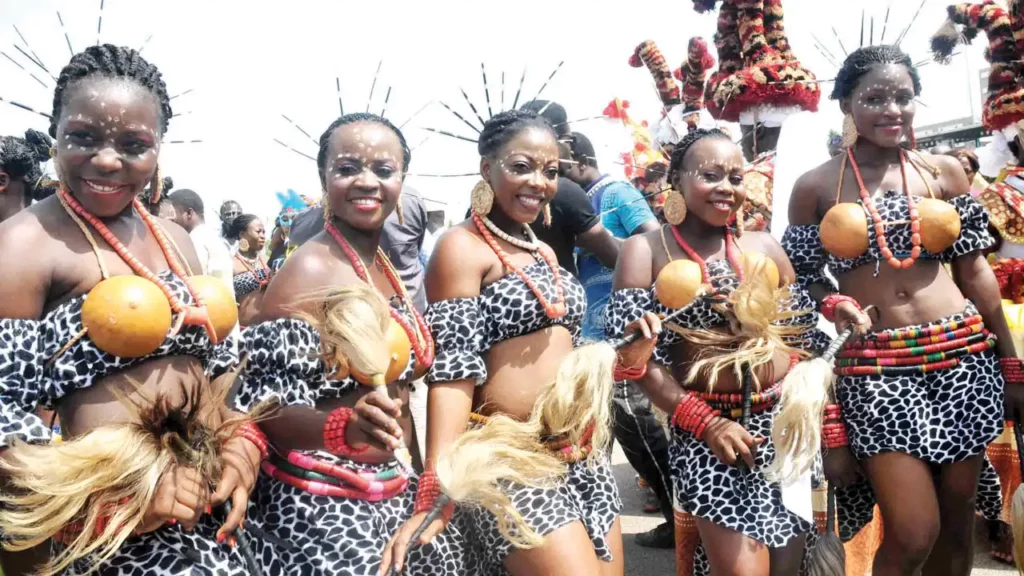
Next on the list of African tribes is the Igbo. Igbo people are a popular African tribe that has about 45 million people. Although they are also found in Guinea, their main home is the current Nigeria, where they make up approximately 18% of the population. They mostly speak the Igbo language, which is their language.
The best hypotheses on the Igbo’s beginnings date to approximately 3000 BCE and are supported by certain pottery that was discovered and demonstrated similarities to later Igbo practices. Through excavations, it was possible to discover proof of early iron smelting in the Igboland region of Nsukka. They have historically operated under a democratic republican form of government. They have their banking system and calendar.
Some well-known Igbo are famous footballers, Nwanko Kanu and Jay-Jay Okocha, as well as the first President of Nigeria, Abubakar Tafawa Balewa.
If you already like our Facebook page, I’m sure you will enjoy our Facebook group for even easier interaction.
Join our Spotcovery Global Black Community Facebook Group for early access to exclusive content and to share in a lively discussion.
3. Yoruba – Nigeria, Benin

Third among the most popular African tribes is the Yoruba tribe. The Yoruba are a tribe that has a population of about 47 million people.
Found mostly in West Africa, this African tribe has a presence in Nigeria (43.4 million) and Benin (1.4 million). The Niger-Congo language family includes the Yoruba language, spoken by the majority of Yoruba.
History has it that the Yoruba people inhabited southwest Nigeria in the early 9,000 BC (11,000 years ago). This is based on skeletal remains found in Iwo-Eleru, in present-day Ondo State, southwest Nigeria.
An interesting fact is that the Yoruba are the dominant cultural force in Nigeria, and their cities are the most populous not only in Africa but also in the world.
This African tribe has their very own unique cloth known as the Aṣo-Oke.
Some of the prominent Yoruba are actresses in Nollywood, politicians, and former heads of state like Olusegun Obasanjo.
4. Zulu – South Africa
The next tribe on our list of the most popular African tribes is the Zulu tribe.
This African tribe is popular not because of its numbers but because of Shakaland, acknowledged worldwide as the birthplace of the legendary Shaka Zulu.
Known to be the largest ethnic group in South Africa, the Zulu have an estimated population of 11 million people. They speak the Zulu language. They are believed to have originated from Nguni communities that took part in the Bantu migrations over millennia.
Beadwork is worn by all men, women, and children at any age. Depending on which stage of life an individual is in, the beadwork indicates different meanings.
Prominent Zulus include Edward “Sonnyboy” Bhengu, a South African activist and founding member of the Pan Africanist Congress of Azania, Rev. Nicholas Bhengu, Assemblies of God founder.
Other prominent tribes in South Africa are Xhosa, San people. The descendants of San or the bushman tribe are in southern Africa countries such as Lesotho, Botswana, Zambia, Angola, Zimbabwe, and Namibia. In parts of South Africa, such as Gauteng, Limpopo and Mpumalanga is another tribe, the Southern Ndebele tribe.
5. Amazigh – Morocco, Algeria, Tunisia, Libya, Egypt, Mali, Mauritania and Niger
The Amazigh are made up of about 40 million people. This African tribe is mostly found in Morocco and Algeria in north Africa but is also found in Tunisia, Libya, Egypt, Mali, Mauritania, and Niger. Though they also speak Arabic, most of them speak the Amazigh language.
The African tribe has inhabited the Maghreb region in northwestern Africa for more than 12,000 years now. Cave paintings from 10,000 BC are attributable to the Amazigh.
Numidia was an ancient Amazigh kingdom that was very prosperous at the height of its success. Key Amazigh personalities are Juba II (King of Mauretania Caesariensis), Jugurtha (a King of Numidia), and Ahmed Ouyahia, a four-time prime minister of Algeria.
Famous sportsmen like Zidane and Benzema hail from the Amazigh ethnic group.
6. Oromo – Ethiopia
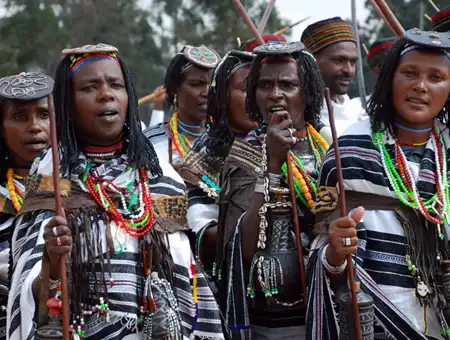
The next tribe on our list of the most populous African tribes is the Oromo, numbering about 40 million people. Oromo are mostly settled in Ethiopia and represent 34.5% of the population in that country.
The Oromo language is associated with the Oromo, who also have their own religion, which some follow to this day, known as Waaqeffanna.
The Oromo can be traced back to the 16th century when scholars noted that this African tribe migrated to find more grazing lands as they were pastoral people. They had no kings, instead electing Lubas.
The Oromo are known to be still governing themselves via the Gadaa system and are one of the older examples of African democracy in action.
Some notable Oromo personalities are the current Prime Minister of Ethiopia, Abiy Ahmed Ali, and the current President of the Federal Democratic Republic of Ethiopia, Sahle-Work Zewde.
Read also: Meet the Dinka Tribe: The Tallest People in Africa
7. Fulani – Nigeria, Mali, Guinea, Cameroon, Senegal, Chad, South Sudan, Ghana, and Niger
With over 40 million people, the Fulani tribe is one of the most popular tribes in Africa.
This African tribe lives mainly in Western African nations such as Nigeria, Mali, Guinea, Cameroon, Senegal, South Sudan, Niger, Ghana, and Chad. Their unique language is known as Fula.
The origin of the Fulani remains unclear, but many conceptions point to where they originated from. According to Fulani oral traditions, they originated in what is now known as Jordan.
Become an insider. Subscribe to our newsletter for more top trending stories like this!
What we have also gathered is that by the 5th century, they were in West Africa, with the earliest evidence from archaeological searches pointing to them starting around the 6th century BC.
The Fulani are one of the few African tribes to adopt Islam, with 98% of the Fulani being Muslims. The prominent Fulani consist of the first President of Cameroon, Ahmadou Ahidjo, and Major General Mohammadu Buhari, the current President of Nigeria.
8. Amhara – Ethiopia
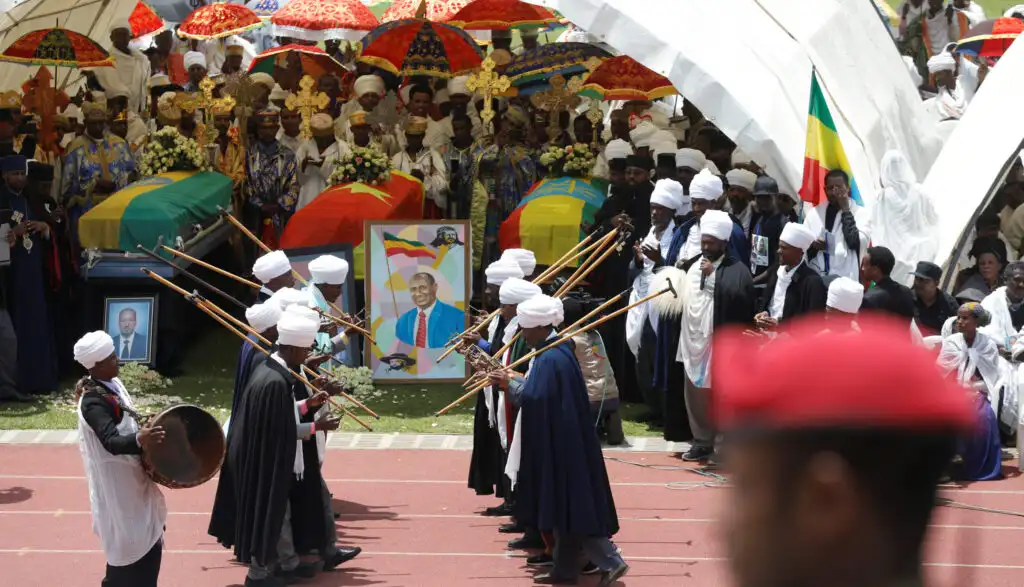
The Amhara tribe has approximately 20 million members and is primarily found in Ethiopia. They make up 26.9% of the total population in Ethiopia, making it one of the most popular African tribes on the continent.
Having historically lived in the Northern, Central and Western parts of Ethiopia, the Amharas are regarded as the indigenous people of this African country.
The Amhara was first mentioned in history in the 12th century when they were at war with the Werjih. This demonstrated that they had been there in this region for a lot longer than the region’s generally recognized thirteenth-century arrival date. In actuality, the investigation revealed that they have been residing in Ethiopia for more than 2000 years and have done so in the Central Highlands Plateau for the majority of that time.
The Amharic language is the known language of the Amhara, which is spoken by 23.9% of the total population of Ethiopia.
There have been many famous Amhari who have been either Emperors or Prime Ministers in Ethiopia. Some of the distinguished Amhara are Getatchew Mekurya, a legendary Ethiopian jazz saxophonist; Eleni Gebre-Medhin, a prominent female Ethiopian economist; and Berhaneyesus Demerew Souraphiel, an Ethiopian Catholic cardinal and Head of the Ethiopian Catholic Church.
9. Akan – Ghana, Ivory Coast
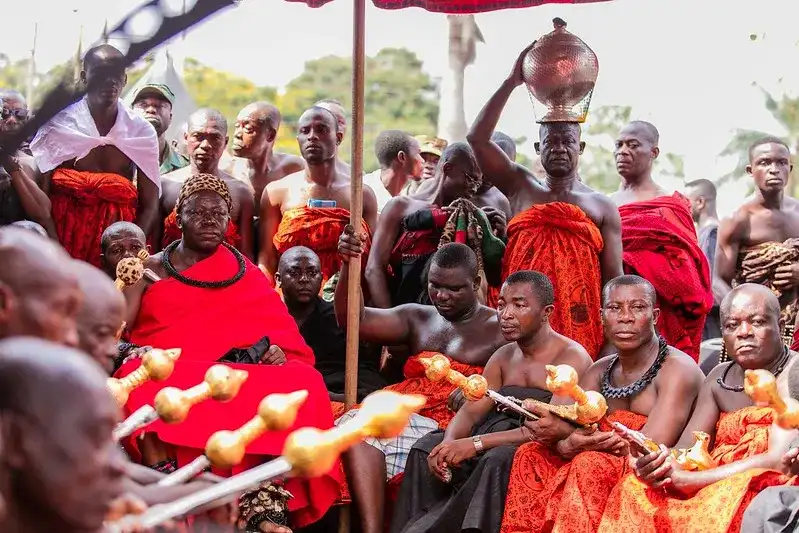
About 20 million members of the Akan tribe live in Ghana and the Ivory Coast, primarily in the south of both nations. They speak the Akan language, which is their native tongue, belonging to the Central Tano branch of languages,
According to their oral traditions, the origin of the Akan can be traced to Ghana. They are believed to have settled in their current region in about the 11th century, having passed through Egypt in the 5th century, and eventually settling in Nubia. However, it is thought that after Nubia was invaded, they moved to Ghana, which was then the Gold Coast.
The Ashanti Empire, the most powerful Akan empire that existed for almost 200 years, was created by this African tribe, which has a fascinating history. There were numerous Akan subgroups, each of which established its own kingdom.
Kwame Nkrumah, the founder of the Pan-African movement, was of Akan origin. So was Kofi Annan, who was the head of the United Nations and was also awarded the Nobel Peace Prize.
10. The Somali – Somalia, Djibouti, Ethiopia and Kenya
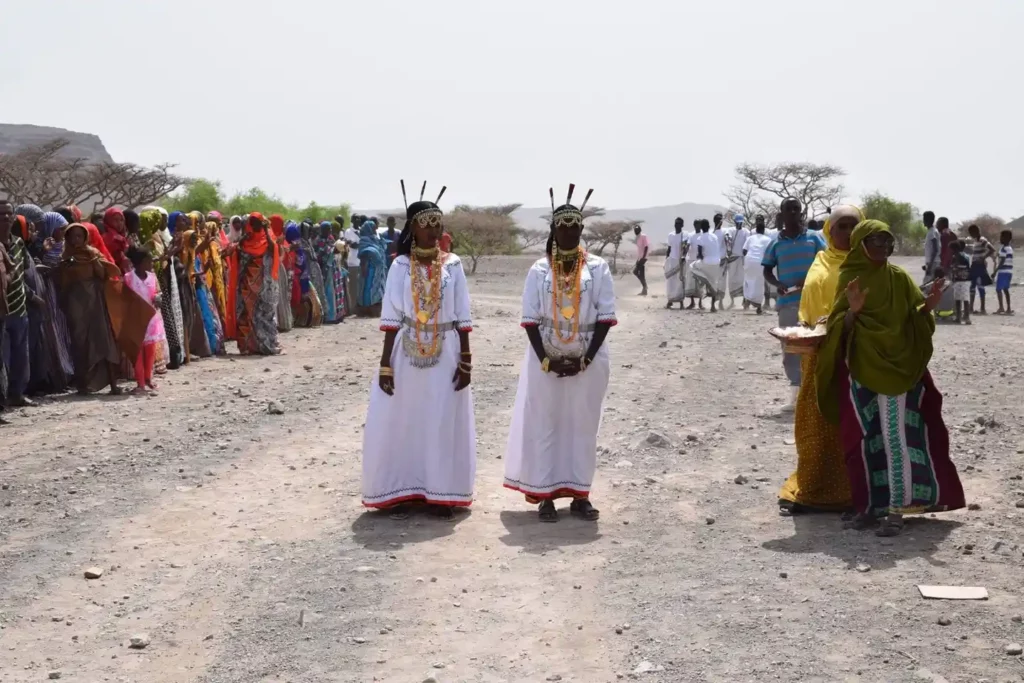
With a population of more than 20 million people, the Somali tribe can be found in Somalia, making up about 85% of the population of this country. They can also be found in Djibouti, Ethiopia, and Kenya.
The Somali tribe dates its beginnings to roughly 7,000 years ago. Recent linguistic and archaeological research has established that the Somali tribe are the original inhabitants of the Horn of Africa. There they have resided for more than 7,000 years.
The Somali language, which is a Cushitic language, is spoken by the majority of people. A total of about 22.3 million people worldwide speak Somali as their mother tongue. A large number of Somali tribes also speak Arabic in addition to Somali.
Somali culture is renowned for its cuisine, hospitality, and status as a “country of poets.” Numerous prominent Somali tribe members include prominent economist Abdusalam, American politician Ilhan Omar, and several Somali prime ministers and presidents.
11. The Hutu – Rwanda, Burundi and Congo
The Hutu Tribe has a population of around 20–25 million people, settled primarily in two countries, with an extension to the eastern Democratic Republic of the Congo. In Rwanda and Burundi, around 85% of the people are Hutu, and a combined 21 million Hutu live in these two countries.
In the Democratic Republic of the Congo, this African tribe only forms about 2% of the population. The Bantu people moved to the area around the Great Lakes in Africa during the great Bantu expansion, which is where the Hutu people got their start.
The Tutsi and the Twa both speak Rwanda-Rundi, a language belonging to the Bantu family, as do the Hutus.
Only a small minority of Hutus are fluent in French. The Hutu and Tutsi tribes coexisted in a state of relative peace until European colonial conquest, which strained relations between the two tribes and ultimately resulted in the genocide in Rwanda.
Numerous well-known Hutus have served as presidents of Rwanda, and some have served as prime ministers of Burundi.
The Hutus were known for their pottery and craftsmanship, while music and dancing remain critical cultural components of the Hutu tribe.
12. Maasai – Kenya and Tanzania
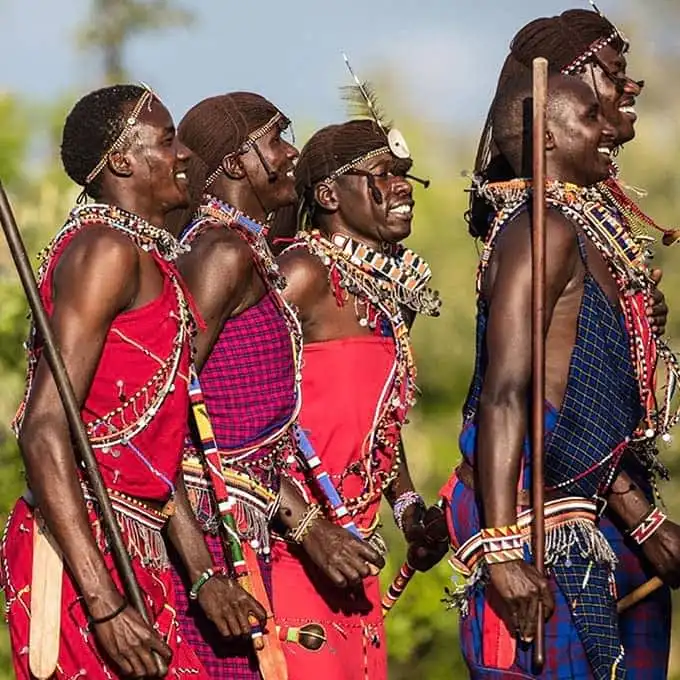
Maasai or Masai is one of the tribes in Kenya and Tanzania. The Maasai tribe are a Nilotic ethnic group inhabiting northern, central and southern Kenya and northern Tanzania and they are about two (2) million and are nomadic pastoralists
Their residence near the many game parks of the African Great Lakes and their distinctive customs and dress have made this tribe the best-known local population internationally.
Oral traditions teach that the incoming Maasai forcefully displaced many ethnic groups that had already formed settlements in the region, while other, mainly Southern Cushitic groups, were assimilated into Maasai society. Many of the great East African wildlife parks are within their reach. The tribe is now semi-nomadic, herding cattle.
They believe the sky god Ngai, who lowered them to earth on a leather thong, gave the cattle to them. Cattle are cherished and are their source of income and nourishment, with the Maasai diet supplemented by a mixture of cow milk and blood.
The Maasai in Kenya speak in Maa and they share this dialect with the Samburu tribe. The samburu also rear livestock such as sheep, goats and cows just like the Maasai.
13. The Ewe Tribe – Ghana, Togo, Benin and Nigeria
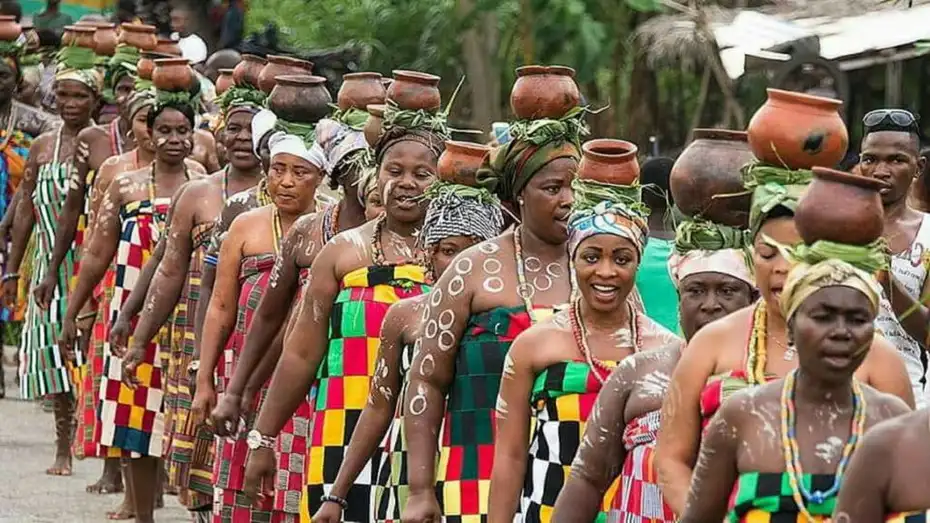
Ewe is also one of the most popular tribes in Ghana and other parts of Africa. The Ewe people are a Gbe-speaking tribe. The largest population of Ewe people is in Ghana, and the second largest population is in Togo, with a total population of 10.3 million.
They speak the Ewe language which belongs to the Gbe family of languages.
The Ewe tribe makes up 11% of Ghana’s total population and is one of the most well-known in the nation for its long-standing traditions and musical heritage.
The majority of this African tribe, which originated in Togo and the Volta region, are farmers and fishermen. However, more recently, they have expanded into weaving and other trades when rainfall has been scarce.
The primary social group for many Ewe tribe members is their extended family, with whom they spend a lot of time. Other distinctive features of this tribe include dancing and drumming, and on important occasions, hunting dances, peace dances, and war dances are frequently performed to the rhythm of drums.
Jerry John Rawlings, the former President of Ghana, is a notable member of the Ewe tribe. Philip Gbeho, musician and composer of Ghana’s national anthem; Sylvanus Olympio, first president of the Republic of Togo, among many others
From the list of the most popular tribes in Africa, it is common to see that almost every tribe has its own unique language and culture, which presents a unique opportunity for the continent to thrive in its unity and diversity.
From the most popular African tribes discussed, it is common to see that almost every tribe has its own unique language and culture, which presents a unique opportunity for the continent to thrive in the unity of diversity. The tribal influences have shaped the African culture as it is a dominant force.
People also read: The Bodi Tribe of Ethiopia Where Men Drink Cow’s Blood and Milk
Nearly 80% of consumers turn to directories with reviews to find a local business. List your business for free in our exclusive Spotcovery Black-Owned Business Directory
Become an insider. Subscribe to our newsletter for more top trending stories like this!





